Six Flags America
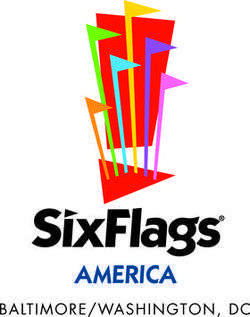 | |
| Location | Upper Marlboro, Maryland, U.S. |
|---|---|
| Coordinates | 38°54′22″N 76°46′21″W / 38.90620°N 76.77257°WCoordinates: 38°54′22″N 76°46′21″W / 38.90620°N 76.77257°W |
| Owner | Six Flags |
| Opened | 1974 |
| Previous names |
Largo Wildlife Preserve - 1974 to 1978 Wild Country - 1978 to 1981 Wild World - 1982 to 1993 Adventure World - 1994 to 1998 |
| Operating season | March through January |
| Area | 523 acres (2.12 km2)s (131 acres currently used for park operations) |
| Rides | |
| Total | 54 |
| Roller coasters | 9 |
| Website |
www |
Six Flags America is a theme park located near Upper Marlboro, Maryland.[1][2] It is situated 15 miles (24 km) east of Washington D.C. and 30 miles (48 km) southwest of Baltimore. The park covers 523 acres (2.12 km2), 131 of which is currently used for park operations. Founded as a wildlife center in 1973 by Ross Perot, ABC television operated the park as a drive-through safari called The Largo Wildlife Preserve beginning in 1974 until its closure in 1978. The property was bought by Jim Fowler's Wild Kingdom; thereafter the site was converted from a wildlife preserve into a theme park named Wild World gradually over the years. In 1992, the park was renamed Adventure World after being acquired by Premier Parks, and ultimately was branded as the 10th Six Flags park when Premier Parks acquired Six Flags Inc. and adopted its name in 1999. The "America" in the park's name was chosen regarding the close proximity to the United States' capital.
History
Early years
The park's history dates to 1973, when Texas billionaire H. Ross Perot and a pair of Irish animal trainers first proposed a wildlife preserve on more than 400 acres (1.6 km2) of corn and tobacco fields. ABC television later bought out Perot and his partners and opened the park as a drive-through safari called The Largo Wildlife Preserve in July 1974, projecting 850,000 visitors a year.
The initial projections that were expected never materialized. In 1975, the park added narrated tours through four-car 150-person trains. However, the park failed to generate a profit. In 1976, ABC bowed out, citing massive losses. The park stayed open with a decreased staff in 1977 and was closed altogether for the 1978 season.
Then at the end of 1978, the park was sold to Jim Fowler, the host of Wild Kingdom. In the 1979 season, the park reopened with the train tour through a safari and a small park with a children's playground, animal shows, and a petting zoo. The park continued to not be profitable but stayed open summers through the 1979 season when Fowler's company bowed out as well. The park again was closed for the 1980 season.
In the Summer of 1980, the park was sold to a group of local businessmen and reopened in 1981. The animal drive-through safari remained. The park added three carnival flat rides, two kiddie rides, and a merry-go-round. Also that year, the park became known as Wild World. In addition to the few rides, four tube waterslides were added, along with two body slides and a children's water play area. This brought modest improvements in revenue.
In 1982, four more flat carnival rides, including a Ferris wheel and giant swings, were added. The waterslide area was expanded at the time to a full water park with the addition of a couple more water slides and a large wave pool. The park's attendance improved but the park still was losing money. For the 1983 season, the animal drive-through safari did not reopen. The animals were sold. In 1984, most of the adult rides were removed from the park and put in storage, leaving only three. Some of the children's rides also remained. The park opted to move in the direction of being only a water park. A new stadium was built that year along with a couple more water slides. The park did very well on hot days but on cooler days attendance was very low due to the fact the park had mostly swimming and watersliding.
In 1985, the rides were therefore brought back out of storage. That year, Wild World's management wanted to build a major wooden rollercoaster for the park in the 1986 season, but the costs were too high. At the time, Knoebels park in Pennsylvania had acquired a used rollercoaster called the Phoenix from a defunct park in Texas. Wild World's management then recruited Bill Dinn, who had worked in the industry since the 1950s and played a role in Knoebel's acquisition of the Phoenix, to find a similar coaster for Wild World.
Boston's Paragon Park closed at the end of 1984. The Giant Coaster—which had operated there since 1917—was put up for sale. During the spring of 1985, Wild World bought the old wooden coaster, renamed The Wild One, and rebuilt it in part of the former animal park. The coaster opened for the spring of 1986 to very positive reviews. A kiddie coaster was added to the park at the same time.
For the 1987 season, Wild World added another water play area and a lazy river. In 1988, the park renovated the buildings and midways, but managed to add a couple more flat rides. In 1989, a log flume was added, along with a family raft waterslide in the water park area. In 1990, the park began to have maintenance issues with many of their flat rides. In 1991, only nine flat rides remained and the park was put up for sale.
Adventure World
In 1992, Wild World was purchased by Premier Parks and renamed Adventure World. That year several flat rides and a few kiddie rides were added. In 1993, Adventure World added its second adult rollercoaster. Premier Parks had acquired Lightning Loops from Six Flags. This was a dual-track steel single looping shuttle coaster located at Six Flags Great Adventure. One of the tracks was sent to Premier Parks' Frontier City located in Oklahoma City (where it still operates today), while the other track became known as the Python and would be located at Adventure World. Also, a water ride called Shipwreck Falls, in which a 15-person boat would run up a steel track and down a 45-foot (14 m) drop into a splashwater pool, was added. More flat rides were added in 1994.
In 1995, Vekoma's first Mind Eraser, an inverted looping suspended coaster, was added. This was branded a SLC. In 1996, a free-fall drop-down ride called the Tower of Doom and made by Intamin was added. In 1997, the park added a second dry water ride called Typhoon Sea Coaster, which was a log flume/junior rollercoaster hybrid. It was later renamed Skull Mountain and eventually closed in July 2011[3] to make room for a new roller coaster.[4] In 1997, the water park was renovated, eliminating some older slides, adding newer slides and extensively remodeling the children's water play area.
Six Flags ownership
In 1998, Premier Parks acquired the Six Flags amusement park chain from Time Warner, forming the company Six Flags Incorporated. The same year, a wooden roller coaster called Roar, which was built and designed by Great Coasters International, was added to Adventure World. At the end of 1998 season, Six Flags announced that Adventure World would be branded with the Six Flags theme and renamed Six Flags America for the 1999 season. Other changes included the addition of Gotham City, a new section in the park, a bungee ride called Skycoaster, and three new coasters – Two Face: The Flip Side, The Joker's Jinx (the park's only launched roller coaster), and Great Chase replacing Cannonball in the kiddie area. Python was closed and moved to into storage.
For the 2000 season, a new hypercoaster called Superman: Ride of Steel from Intamin opened. Its layout is a mirror image of Darien Lake's Ride of Steel which opened the previous year. Batwing, a flying coaster from Vekoma, debuted in 2001. Several flat rides were added in 2002, and a river rapids ride called Blizzard River was added in 2003. In 2005, the Paradise Island water park was upgraded and retitled Six Flags Hurricane Harbor. The transition from Paradise Island to Hurricane Harbor saw the addition of a new Tornado water slide as well as renovations to existing attractions and buildings. Tony Hawk's Halfpipe water slide was added in 2008.
In 2010, Six Flags America renovated the Hurricane Bay wave pool deck, adding a new stamped, concrete deck and additional shading. Also the same year, the Thomas Town family area opened featuring eight rides and attractions all themed to Thomas the Tank Engine. The 3.5-acre (14,000 m2) area was billed as North America's largest Thomas Town and marked Six Flags America's largest expansion in more than a decade. Several months later, Six Flags would announce the removal of several licensed agreements as a result of restructuring following the company's emergence from bankruptcy. Thomas the Tank Engine, Tony Hawk, The Wiggles, and Evel Knievel themes would be removed from all Six Flags parks beginning in 2011. At Six Flags America, Thomas Town was renamed Whistlestop Park, and Tony Hawk's Halfpipe slide was renamed Halfpipe.[5][6]
For 2012, the park added Apocalypse, a stand-up roller coaster from Bolliger & Mabillard, which featured two inversions and a ten-story drop. The roller coaster had previously operated as Iron Wolf at Six Flags Great America.[7]
In 2013, the park added the six-slide complex Bonzai Pipelines to Hurricane Harbor.[8][9]
In 2014, Six Flags re-themed a section of the park to feature Mardi Gras. The area would feature a new roller coaster named Ragin' Cajun and a set of Flying Scooters named French Quarter Flyers.[10] Like Apocalypse, Ragin' Cajun was relocated from Six Flags Great America, and it was placed in the former location of Two Face: The Flip Side which was removed from the park in 2007. The Mardi Gras section replaced Southwest Territory, and the area's existing rides were rethemed to match the new Mardi Gras theme. Drop of Doom, for example, was renamed Voodoo Drop.[11]
In 2015, a flat ride called Bourbon Street Fireball was added. This ride is commonly known as a Super Loop. Similar rides were also added to three other Six Flags parks.
In 2016, Six Flags America is adding a new family water play structure to Hurricane Harbor named Splashwater Falls, which will be replacing the former Crocodile Cal's Beach House.
Six Flags America announced on September 1, 2016 that they would be adding a Funtime Starflyer model, similar to the many SkyScreamer rides at other locations in the chain. At 24 stories (~250 feet), it will be the tallest ride in the park.
The Flash Pass
The Flash Pass, named after the Justice League character, is a virtual queuing system that allows customers to wait in a virtual line, thereby allowing them to engage in other activities while they wait. With the introduction of the Flash Pass in April 2010, visitors can “hold their place in line” electronically allowing them to go elsewhere in the park while waiting for an attraction. They will be alerted by the Flash Pass device when it is almost their turn to ride. Three types of Flash Pass are available: Regular, Gold and Platinum, a Regular pass simply “holds your place in line” with an average waiting time of 50 minutes, the Gold holds your place as well as giving you a reduced wait time of about 20 minutes per ride and the Platinum reduces the waiting time to 5 minutes and allows you to "Get in line once, Ride Twice -, while you are only allowed to ride once by any other means, Platinum gives you the opportunity to remain seated and ride the roller coasters again. The Flash Pass is purchased separately from the normal park admission. There are a limited number of Flash Passes available for purchase on a given day.
Themed sections
The themed sections of the park are: Main Street 1776, Chesapeake (formerly Olde Boston), Looney Tunes Movie Town, Mardi Gras (formerly Southwest Territory), Gotham City, Coyote Creek, Whistlestop Park, and Hurricane Harbor (water park).[12] Each section has rides or a theme that have something to do with the section.
Current rides
Roller coasters
| Ride Name | Picture | Opened | Manufacturer/Ride Type | Status | Location | Notes |
|---|---|---|---|---|---|---|
| The Wild One |  |
1986 | Dinn Corporation/Wooden | Operating | Mardi Gras |
Relocated from Paragon Park in Hull, Massachusetts as Giant Coaster. |
| Mind Eraser |  |
1995 | Vekoma/Suspended Looping Coaster | Operating | Coyote Creek | The first "Mind Eraser"; has 3 duplicates at Six Flags New England, and Darien Lake, and Elitch Gardens. |
| Roar | 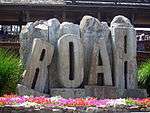 |
1998 | Great Coasters International/Wooden sit down | Operating | Chesapeake | The first "Roar" and the only one still standing; had one duplicate at Six Flags Discovery Kingdom. |
| The Joker's Jinx | 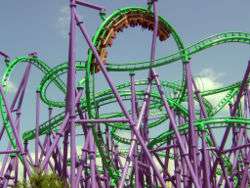 |
1999 | Premier Rides/LIM launch steel sit down twister | Operating | Gotham City | Similar layout to Flight of Fear coasters at Kings Island and Kings Dominion, and identical to Poltergeist at Six Flags Fiesta Texas. |
| Great Chase | |
1999 | Zamperla/Kiddie steel sit down | Operating | Looney Tunes Movie Town | |
| Superman: Ride of Steel |
|
2000 | Intamin/ Megacoaster | Operating | Gotham City | Mirror image of Ride of Steel coaster at Darien Lake. |
| Batwing | 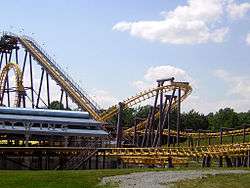 |
2001 | Vekoma/Flying Dutchman | Operating | Gotham City | Mirror image of Firehawk at Kings Island and similar to Nighthawk at Carowinds. |
| Apocalypse | |
2012 | Bolliger & Mabillard/Steel stand-up | Operating | Chesapeake | Relocated Iron Wolf coaster from Six Flags Great America. |
| Ragin' Cajun | |
2014 | Zamperla/Spinning Wild Mouse | Operating | Mardi Gras | Relocated Ragin' Cajun coaster from Six Flags Great America on the site of Two-Face and Python. |
Flat rides
| Name | Opened | Manufacturer/Ride Type | Location | Notes |
|---|---|---|---|---|
| Capital Railways | 1983 | General Electric/Train ride | Chesapeake | The 3 ft (914 mm) narrow gauge[13] train ride originally was opened during the Wild World years and was called Wild World Railroad. Under Premier ownership, it was mostly used for catered picnic customers only, it was opened to everyone in 2009. |
| Carousel | 1983 | International Amusement/Carousel | Chesapeake | The former stripe colors on the Carousel canopy were Yellow & Blue 1988-1998. Now 1999–present Red & White canopy was switched when Six Flags America open. |
| High Seas | 1984 | Intamin/Swinging ship | Chesapeake | This ride was purchased from the defunct Little England Theme park in Florida |
| Pirate's Flight | 1982 | Intamin/Flying Dutchman | Chesapeake | Moved to the former site of the Curving Dervish in 1996. |
| Coyote Creek Crazy Cars | 1990 | Preston Amusements/Bumper cars | Coyote Creek | Named Los Coches Chocos |
| Cyclone | 1993 | Eli Bridge/Scrambler | Chesapeake | Originally called Scrambler. Moved to the former site of Pirate's Flight in 1996. Formerly known as Scrambler (1993-1996), the ride was renamed to Cyclone when it was moved to the area that where French Quarter Flyers currently resides in Mardi Gras. The ride was moved again to Chesapeake in 2011 in the location where The Octopus formerly resided. |
| Great Race | 1993 | Antique cars | Chesapeake | |
| Zydeco Zinger | 1993 | Chance Rides/Falling Star | Mardi Gras | Formerly known as Falling Star, the ride was renamed to Zydeco Zinger due to Southwest Territory being rethemed to Mardi Gras in 2014. |
| Shipwreck Falls | 1993 | Hopkins Rides/Shoot the chute water ride | Chesapeake | |
| Renegade Rapids | 1995 | Hopkins Rides/Rapids water ride | Coyote Creek | |
| Tea Cups | 1995 | Zamperla/Tea cups | Chesapeake | They used no cover for the Tea Cups at Adventure World (1995–1998). A cover was added for the Tea Cups when park became Six Flags America, 1999–present. |
| Flying Carousel | 1995 | Zamperla/Flying carousel | Chesapeake | |
| Big Easy Speedway | 1996 | J&J Amusements/Go-karts | Mardi Gras | Extra-charge attraction. Formerly known as Sahara Speedway (1996–2003) and Sonora Speedway (2004–2013), the ride was renamed Big Easy Speedway due to Southwest Territory being rethemed to Mardi Gras in 2014. |
| Riddle Me This | 1983 | Fahtz / IAD Round up | Gotham City | Originally Named World Wind, location moved to Gotham City section in 1999 |
| Voodoo Drop | 1996 | Intamin/140 ft (43 m).tall Giant Drop | Mardi Gras | Formerly known as Tower of Doom (1996–2014), the ride was renamed Voodoo Drop due to Southwest Territory being rethemed to Mardi Gras in 2014. |
| Rodeo | 1999 | Huss/Breakdance | Coyote Creek | A Huss Breakdance style 4/rodeo with cow themed cars. |
| Sky Coaster | 2001 | Skycoaster, Inc./Sky coaster | Gotham City | Extra-charge attraction. |
| Penguin's Blizzard River | 2003 | WhiteWater West/Spinning rapids water ride | Gotham City | |
| French Quarter Flyers | 2014 | Larson International/Flying Scooters | Mardi Gras | Located where the rock-wall formerly resided. |
| Bourbon Street Fireball | 2015 | Larson International/Fireball | Mardi Gras | A Larson super loop that is at almost every six flags park. |
| Wonder Woman Lasso of Truth | 2017 | Funtime / Starflyer | TBA | A 24 story (~250 feet) swing ride, similar to other parks. Upon completion, it will be the tallest ride in the park. |
Kiddie rides
Six Flags America's Kid Sections are Looney Tunes Movie Town and Whistlestop Park.[6] Former Kid's Area was Thomas Town that only operated during the 2010 season.
| Name | Opened | Manufacturer/Ride Type | Location | Notes |
|---|---|---|---|---|
| Up, Up & Away | 1993 | Zamperla/Family size ferris wheel | Whistlestop Park | Used to be located in Olde Boston as Around the World in 80 Days from 1993 - 2009. Moved in Thomas Town in 2010 as Sodor Carnival Ferris Wheel; and rethemed in 2011. |
| Elmer’s Around the World in 80 Seconds | 1993 | Zamperla/Kiddie balloon flight | Looney Tunes Movie Town | Named Balloon Flight until 1999 |
| Foghorn Leghorn’s Tinsel Town Train | 1993 | Zamperla/Kiddie train ride | Looney Tunes Movie Town | Named Circus Train until 1999 |
| Looney Tunes Prop Warehouse | 1999 | Kiddie soft play area | Looney Tunes Movie Town | |
| Pepe Le Pew’s Tea Party | 1999 | Zamperla/Kiddie tea cups | Looney Tunes Movie Town | |
| Sylvester’s Pounce and Bounce | 1999 | Kiddie drop ride | Looney Tunes Movie Town | |
| Taz’s Film Works | 1999 | Kiddie swings ride | Looney Tunes Movie Town | |
| Yosemite Sam’s Hollywood Flight School | 1999 | Kiddie airplane ride | Looney Tunes Movie Town | Originally called Movie Town Airport (1999–2004). |
| Happy Junction | 2010 | Kiddie convoy ride | Whistlestop Park | It was known as Diesel Derby in 2010 in Thomas Town; and rethemed in 2011. |
| Sky Jumper | 2010 | Family drop ride | Whistlestop Park | It was known as Cranky the Crane Tower in 2010 in Thomas Town; and rethemed in 2011. |
| Splash Zone | 2010 | Pop jet fountain | Whistlestop Park | It was known as Thomas Town Pop Jet Fountain in 2010 in Thomas Town; and rethemed in 2011. |
| Whistlestop Bus Line | 2010 | Zamperla/Kiddie crazy bus | Whistlestop Park | It was known as Bertie the Bus in 2010 in Thomas Town; and rethemed in 2011. |
| Whistlestop Park Playground | 2010 | Playground | Whistlestop Park | It was known as Thomas Town Play Structure in 2010 in Thomas Town; and rethemed in 2011. |
| Whistlestop Train | 2010 | Family train ride | Whistlestop Park | It was known as Thomas the Tank Engine in 2010 in Thomas Town; and rethemed in 2011. |
| Whistlestop Whirlybirds | 2010 | I.E. Park/Mini flight | Whistlestop Park | It was known as Harold the Helicopter in 2010 in Thomas Town; and rethemed in 2011. |
Six Flags Hurricane Harbor
Hurricane Harbor is a water park located within Six Flags America. It was known as Paradise Island until 2005 when it was rebranded Hurricane Harbor.
| Six Flags Hurricane Harbor | |
|---|---|
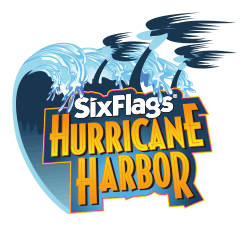 | |
| Owner | Six Flags |
Hurricane Harbor water park is adjacent to the main park and has no additional charge for entry.
| Name | Opened | Manufacturer/Ride Type | Notes |
|---|---|---|---|
| Calypso Cannonballs | 2 small tube drop slides | Named Caribbean Cannonball Flume until 2004 | |
| Riptide | Small body slides | Named Luau Loop until 2004 | |
| Vortex | Small body slides | Named Luau Loop until 2004 | |
| Bamboo Chutes | Small body slides | Named Kid's Flumes until 2004 | |
| Castaway Creek | 1982 | Lazy river | |
| Hurricane Bay | 1982 | Wave pool | Named Monsoon Lagoon until 2004; One of the largest wave pools in the world |
| ZoomAzon Falls | 1982 | 4 twisting body slides | Named Rainbow Falls until 2004. Hurricane Mountain 2005-2008. Formerly tube slides. Closed 2008–2010. Rethemed to an Amazon rainforest and reopened June 2011. |
| Paradise Plunge | 1994 | Proslide Technology Inc./Pipeline | Named Tahiti Twister until 2004 |
| Reef Runner | 1994 | Proslide Technology Inc./Pipeline | Named Tahiti Twister until 2004 |
| Hammerhead | 1997 | Proslide Technology Inc./Giant twister | Named Black Hole until 2004 |
| Mako | 1997 | Proslide Technology Inc./Drop slide | Named Bonzai Pipeline until 2004 |
| Bahama Blast | 2005 | Proslide Technology Inc./Mammoth | |
| Buccaneer Beach | 2005 | Kiddie/family activity area | |
| Tornado | 2005 | Proslide Technology Inc./Tornado 60 | |
| The Halfpipe | 2008 | Water Fun Products/Sidewinder | Waterslide half-pipe for one or two riders. It was known as Tony Hawk's Halfpipe from 2008–2010; and now rethemed in 2011. |
| Bonzai Pipelines | 2013 | SplashTacular DownUnder | Six slides on one complex structure.[8][9] |
| Splashwater Falls | 2016 | Family water play structure | Containing 7 Slides, a Tipping Bucket, and Interactive Elements |
Former attractions
Roller coasters
| Name | Opened | Removed In | Manufacturer/Ride Type | Former Location | Notes |
|---|---|---|---|---|---|
| Python | 1993 | 1998 | Arrow Dynamics Launched Loop | Southwest Territory | Ride was moved from Six Flags Great Adventure (one half of Lightning Loops). |
| The Great Alonzo's Cannonball Coaster | 1993 | 1998 | Molina & Son's kiddie coaster | A Day At The Circus | |
| Two Face: The Flip Side | 1999 | 2007 | Vekoma Invertigo roller coaster | Southwest Territory | See Incidents at Six Flags parks for more information. This roller coaster was sent to Italy, and is opening in 2015. |
Rides
Including Former Hurricane Harbor Water slides
| Name | Opened | Removed In | Manufacturer/Ride Type | Notes |
|---|---|---|---|---|
| Curving Dervish | 1982 | 1995 | Bayern Curve | Exact history not known. |
| Aerial Elephants | 1993 | 1998 | Kiddie ride | |
| Clown Around | 1993 | 1998 | Kiddie ride | |
| Clown Town | 1993 | 1998 | Kiddie attraction | |
| Flying Trapeze | 1993 | 1998 | Kiddie attraction | |
| Kiddie Bumper Boats | 1993 | 1998 | Kiddie ride | |
| Lippazanion Stallions | 1993 | 1998 | Kiddie attraction | |
| Roller Racers | 1993 | 1998 | Kiddie ride | |
| The Juggler | 1993 | 1998 | Kiddie ride | |
| SkyEscaper | 1983 | 2004 | Fahtz / IAD Enterprise 16 | The ride was closed in 2002. |
| Iron Eagle | 1995 | 2005 | Zamperla Rotoshake | |
| Kids' Cove | 1982 | 2005 | Kids area | Located in Hurricane Harbor |
| Krypton Comet | 2000 | 2005 | Chance-Morgan Chaos | |
| Lily Pad Walk | 1982 | 2005 | Located in Hurricane Harbor | |
| The Tilt | 1989 | 2006 | Tilt-a-Whirl | |
| The Animation Department | 1999 | 2007 | Kiddie Carousel | |
| Circus of the Stars | 1982 | 2007 | Kiddie bumper cars | |
| Avalanche | 1999 | 2010 | Chance-Morgan Alpine Bobs | Located in Gotham City. Named Penguins Bobsleds (1999–2003), Alpine Bobs (2003–2006) moved to former Krypton Comet location and renamed in 2006. |
| The Octopus | 2000 | 2010 | Sartori Polyp, monster style ride | Located in Nantucket. On August 3, 2007, a 6-year-old girl was injured on this ride. See Incidents at Six Flags parks for more information. |
| Skull Mountain | 1997 | 2011 | Intamin Reversing Boat Ride 8 water ride | Named Typhoon Sea Coaster, ride was modified and name changed in 2007. The ride took its last voyage on July 10, 2011 and was replaced by Apocalypse: The Last Stand[14] |
| Crocodile Cal's Caribbean Beach House | 1997 | 2014 | Family activity area | Named Crocodile Cal's Outback Beach House until 2005- the "Cal's" portion of the name came from Baltimore Oriole's superstar Cal Ripken. Located in Hurricane Harbor. Replaced by Splashwater Falls. |
See also
References
- ↑ Heideger, Carly (June 20, 2014). "Six Flags America launching new roller coaster this weekend". The Baltimore Sun. Retrieved June 2, 2015.
- ↑ "Directions to the Park". Six Flags America. Retrieved June 2, 2015.
- ↑ "Sx Flags America Prepares Final Voyage For Skull Mountain". Six Flags America. June 9, 2011. Retrieved 17 May 2012.
- ↑ "Six Flags America Announces Apocalypse". Six Flags America. September 1, 2011. Retrieved 17 May 2012.
- ↑ MacDonald, Brady (25 November 2010). "Six Flags amusement parks prepare for thematic makeovers". LA Times. Retrieved 27 November 2010.
- 1 2 "Kids' Rides: Six Flags America". Sixflags.com. Retrieved 2013-03-17.
- ↑ Hendrix, Steve (June 6, 2012). "Apocalypse, new Six Flags roller coaster, gets a test ride from a thrill fanatic". Washington Post. Retrieved October 16, 2012.
- 1 2 "The Power of Six Hits the East Coast". SplashTacular. Retrieved October 8, 2012.
- 1 2 "Six Flags America Introducing World's First Six-Story Six-Tube Body Slide in 2013". SixFlags.com. Retrieved August 30, 2012.
- ↑ "New for 2014". August 29, 2013. Retrieved August 29, 2013.
- ↑ Cooper, Rebecca (August 29, 2013). "Six Flags America to add new roller coaster, Mardi Gras theme". Washington Business Journal. Retrieved August 29, 2013.
- ↑ "Six Flags America Map" (PDF). Six Flags America. Retrieved March 4, 2016.
- ↑ Surviving Steam Locomotives in Maryland
- ↑ "Six Flags America Prepares Final Voyage For Skull Mountain". 9 June 2011. Retrieved 10 June 2011.
External links
| Wikimedia Commons has media related to Six Flags America. |